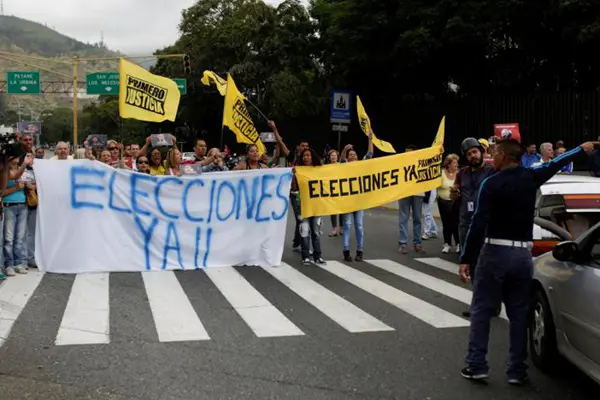Venezuela's government is pushing forward with measures that could exclude some opposition political parties from future elections, potentially paving the way for the ruling Socialists to remain in power despite widespread anger over the country's collapsing economy.
The Supreme Court, loyal to socialist president Nicolas Maduro, has ordered the main opposition parties to "renew" themselves through petition drives whose conditions are so strict that party leaders and even an election official described them as impossible to meet.
Socialist Party officials scoff at the complaints. They say anti-Maduro candidates would be able to run under the opposition's Democratic Unity coalition, which has been exempted from the signature drives, even if the main opposition parties are ultimately barred.
But key socialist officials are also trying to have the coalition banned, accusing it of electoral fraud. Government critics point to this and the "renewal" order as signs the socialists are seeking to effectively run uncontested in gubernatorial elections and the 2018 presidential vote.
Investors holding Venezuela's high-yielding bonds had broadly expected Maduro to be replaced with a more market-friendly government by 2019.
The prospect of opposition parties being blocked from elections could raise concern in Washington where the Trump administration this week blacklisted Venezuela's Vice President Tareck El Aissami and called for the release of jailed opposition leader Leopoldo Lopez.
Maduro's opponents say his strategy is similar to that of Nicaraguan leftist president Daniel Ortega, who cruised to a third consecutive election victory in November after a top court ruling ousted the leader of the main opposition party. That left Ortega running against a candidate widely seen as a shadow ally.
"The regime is preparing Nicaraguan-style elections without political parties and false opposition candidates chosen by the government," legislator and former Congress president Henry Ramos wrote via Twitter, suggesting the government would seek to have shadow allies run as if they were part of the opposition.
The moves come as Maduro's approval ratings hover near 20 percent due to anger over chronic food shortages that lead to routine supermarket lootings and force many Venezuelans to skip meals. His government has avoided reform measures economists say are necessary to end the dysfunction, such as lifting corruption-riddled currency controls.
The elections council has ordered parties to collect signatures from 0.5 percent of registered voters on specific weekends.
The opposition estimates parties could in some cases have to mobilise a combined total of as many as 600,000 people in a single weekend and take them to 360 authorized locations, an arrangement they call logistically implausible.
(REUTERS)
 简体中文
简体中文

